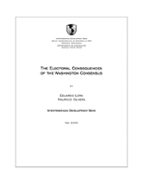The Electoral Consequences of the Washington Consensus
Date
May 2005
This paper assesses how electoral outcomes in both presidential and legislative elections in Latin America have been affected by the adoption of economic policies that seek to improve macroeconomic stability and facilitate the functioning of markets. The database includes 17 Latin American countries for the period 1985-2002, and a total of 66 presidential and 81 legislative elections. The set of testable hypotheses is derived from a review of the literature and is structured around the hypothesis of economic voting. It is found that (i) the incumbents party is rewarded for reductions in the rate of inflation and, to a lesser extent, for increases in the rate of growth; (ii) the more fragmented or ideologically polarized the party system, the higher the electoral rewards of reducing the inflation rate or raising the economic growth rate; (iii) voters care not only about economic outcomes, but also about some of the policies adopted: while the electorate seems blind to macroeconomic policies such as fiscal or exchange-rate policies, it is averse to pro-market policies, irrespective of their effects on growth or inflation; and (iv) the electorate is more tolerant of pro-market reforms when the incumbents party has a more market-oriented ideology. These results suggest that reforming parties have paid a hefty price for the adoption of pro-market reforms, except when such reforms have been undertaken in conjunction with stabilization policies in high-inflation economies.



